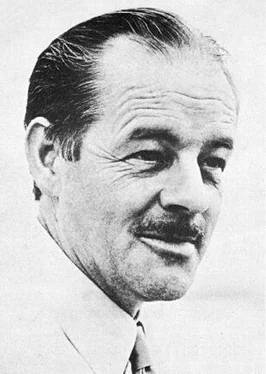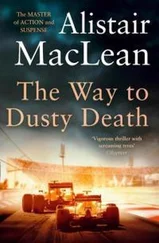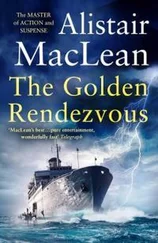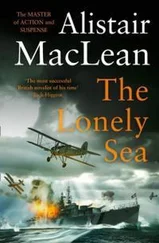Larry swung round, his face an ugly and contorted mask of fury and hate, swearing softly, vilely, continuously. He reached down with his free hand to try to wrench the pistol clear, but the hardest work Larry had ever done was pushing down the plunger of a hypodermic syringe and he was just wasting his time. I wrenched the gun away, stepped back, stiff-armed him joltingly with the heel of my palm as he tried to come after me, broke open the automatic, ejected the magazine and sent it clattering into one corner while the gun went into another. Larry half-stood, half-crouched against the far wall where my push had sent him, blood trickling from his nose and tears of rage and frustration and pain running down both cheeks. Just to look at him made me sick and cold.
‘All right, Royale,’ I said without turning my head. ‘You can put your gun away. The show’s over.’
But the show wasn’t over. A hard voice said: ‘Go pick up that gun, Talbot. And the clip. Put the clip in the gun and give it back to Larry.’
I turned round slowly. Vyland had a gun in his hand and I didn’t care very much for the whiteness of the knuckle of the trigger finger. He looked his usual polished urbane self, but the rigidity of his gun hand and the ever so slightly too fast rate of breathing gave him away. It didn’t make sense. Men like Vyland never allowed themselves to become emotionally involved, far less so concerned over what happened to a punk like Larry.
‘How would you like to go up top and take a walk over the side?’ I asked.
‘I’ll give you till I count five.’
‘And then what?’
‘Then I’ll shoot.’
‘You wouldn’t dare,’ I said contemptuously. ‘You’re not the type to pull triggers, Vyland. That’s why you employ this big bad hatchetman here. Besides, who would fix up the bathyscaphe then?’
‘I’m counting, Talbot.’ As far as I was concerned he’d gone nuts. ‘One … two–’
‘OK, OK,’ I interrupted, ‘so you can count. You’re a swell counter. I bet you can count up to ten. But I bet you can’t count up to all those millions you’re going to lose just because I don’t feel like picking up a gun.’
‘I can get other people to fix up that bathyscaphe.’
‘Not this side of the Atlantic, you won’t. And you haven’t got all that much time to play around with, have you, Vyland? What’s the betting a planeload of the FBI aren’t already on the way to Marble Springs to investigate that curious telegram Jablonsky sent? What’s the betting they aren’t already there? What’s the betting they aren’t knocking on the door of the general’s villa right now, saying, “Where’s the general?” and the butler saying, “Why the general’s just gone out to the rig gentlemen,” and then the FBI saying, “We must call upon the general immediately. We have important things to discuss with him.” And they will call, Vyland, just as soon as this storm blows over.’
‘I’m afraid he’s right, Mr Vyland.’ The unexpected help came from Royale. ‘We haven’t all that much time.’
For a long moment Vyland said nothing. Then he lowered his gun, turned and walked out of the room.
Royale, as always, showed no sign of strain or emotion whatever. He smiled and said: ‘Mr Vyland has gone to eat over on the other side. Lunch is ready for all of us,’ and stood to one side to let us out through the door.
It had been a strange off-beat episode. It didn’t make sense, it didn’t even begin to make any kind of sense at all. I pondered it, I tried to find a shadow of an explanation while Larry collected his gun and ammunition clip, but it was no good, I couldn’t find an explanation to fit the facts. Besides, I’d suddenly realized that I was very hungry indeed. I stood to one side to let all the others except Royale precede me, not so much out of courtesy as to ensure that Larry didn’t shoot me in the back, then hurried, without seeming to, to catch up on Mary and Kennedy.
To get to the other side of the rig we had to cross the hundred-foot width of the well-deck where I’d talked to Joe Curran, the roustabout foreman, in the early hours of that morning. It was by all odds the longest, wettest and windiest hundred feet that I’d ever walked.
They’d rigged up a couple of wire life-lines clear across to the other side. We could have done with a couple of dozen. The power of that wind was fantastic, it seemed to have redoubled in strength since we had arrived on the rig four hours previously and I knew now that we could expect no boat or helicopter to approach the rig until the storm had passed. We were completely cut off from the outer world.
At half-past two in the afternoon it was dark as twilight and out of the great black wall of cumulo-nimbus that all but surrounded us the wind flung itself upon the X 13, as if it were going to uproot it from its thirteen-leg foundation, topple it and drown it in the depths of the sea. It roared and howled across the deck of the oil rig in a maniacal fury of sound, and even at the distance of a couple of hundred feet we could plainly hear above the deep thunder of the storm the cacophonous obbligato, the screaming satanic music as the great wind whistled and shrieked its falsetto way through the hundreds of steel girders that went to make up the towering structure of the drilling derrick. We had to lean at an angle of almost forty-five degrees against the wind to keep our balance and at the same time hang on grimly to one of the life-lines. If you fell and started rolling along that deck you wouldn’t stop until the wind had pushed you clear over the side: it was as strong as that. It sucked the breath from your lungs and under its knife-edged hurricane lash the rain flailed and stung the exposed skin like an endless storm of tiny lead shot.
Mary led the way across this exposed storm-filled working platform, and right behind her came Kennedy, one hand sliding along the wire, his free arm tightly round the girl in front. At another time I might have been disposed to dwell on the subject of luck and how some people seemed to have all of it, but I had other much more urgent things on my mind. I came close up to him, actually treading on his heels, put my head close to his and shouted above the storm: ‘Any word come through yet?’
He was smart, all right, this chauffeur. He neither broke step nor turned round, but merely shook his head slightly.
‘Damn!’ I said, and meant it. This was awkward. ‘Have you phoned?’
Again the shake of the head. An impatient shake, this time, it looked like, and when I thought about it I couldn’t blame him. Much chance he’d had of either hearing or finding out anything with Larry dancing around flourishing his pistol, probably ever since he had come out to the rig.
‘I’ve got to talk to you, Kennedy.’ I shouted.
He heard me this time too; the nod was almost imperceptible but I caught it.
We reached the other side, passed through a heavy clipped door and at once found ourselves in another world. It wasn’t the sudden quiet, the warmth, the absence of wind and rain that caused the transformation, though those helped: compared to the other side of the rig from which we had just come, this side resembled a sumptuous hotel.
Instead of bleak steel bulkheads there was some form of polythene or Formica panelling painted in pleasing pastel shades. The floor was sheathed in deep sound-absorbing rubber and a strip of carpeting covered the length of the passageway stretching in front of us. Instead of harsh unshaded lighting falling from occasional overhead lamps, there was a warm diffused glow from concealed strip lighting. Doors lined the passage and the one or two that were open looked into rooms as finely furnished as the cabins you might find in the senior officer’s quarters aboard a battleship. Oil drilling might be a tough life, but the drillers obviously believed in doing themselves well in their off-duty hours. To find this comfort, luxury almost, in the Martian metal structure standing miles out to sea was somehow weird and altogether incongruous.
Читать дальше
Конец ознакомительного отрывка
Купить книгу












